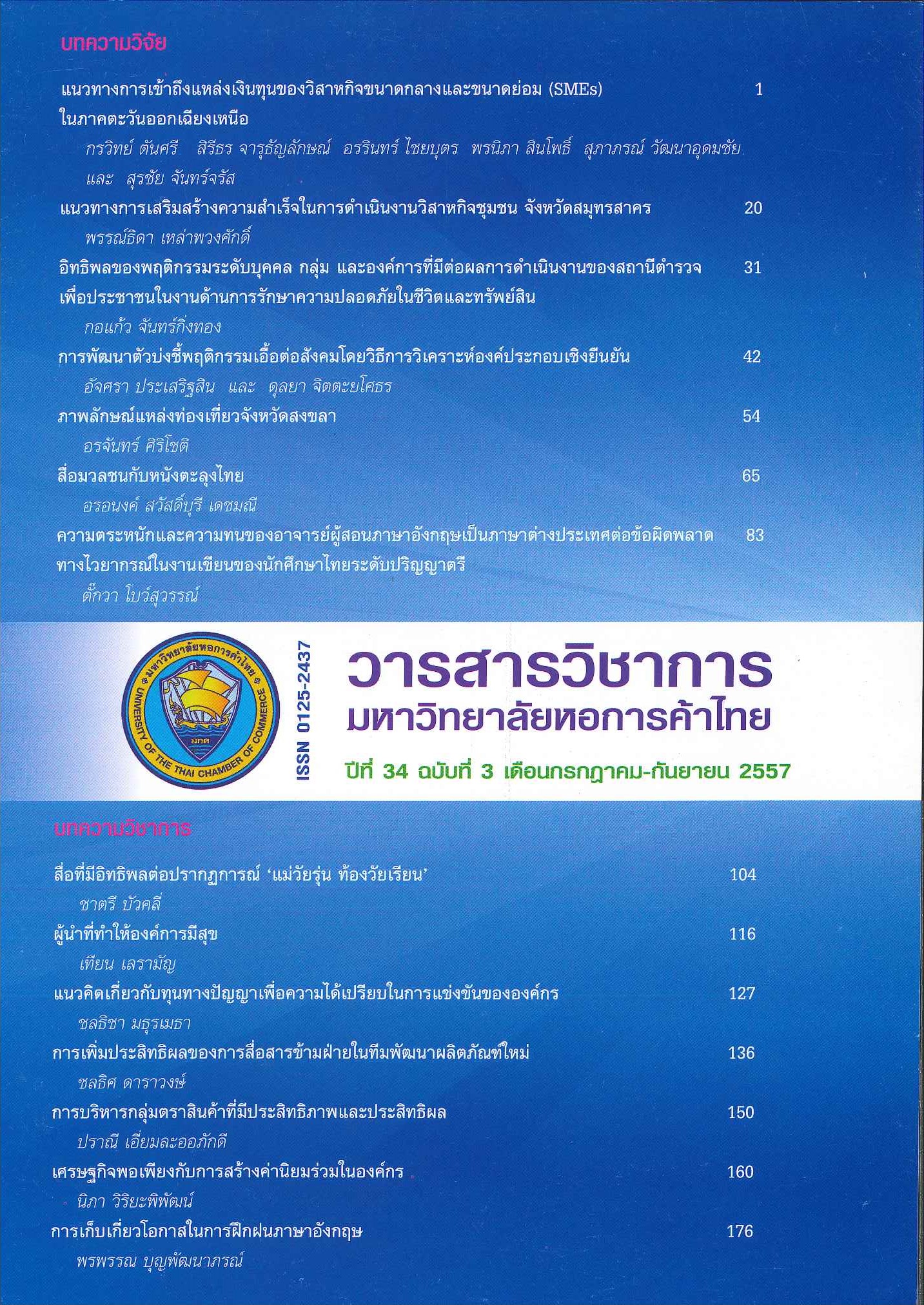The Influence of Individual, Group and Organizational Behaviors on the Performance of Police Stations regarding Their Task of Providing Public Security
Main Article Content
Abstract
The goal of the current study was to examine the influence of individual, group and organizational behaviors on the task of providing security for people’s well-being. In order to assess the above relationships, the study was undertaken at the organizational level in 200 police stations from Provincial Police Regions 1-9 in Thailand. The subjects at the individual level consisted of 200 police supervisors working in police stations responsible for the security of the people; supervisors were used to represent the organization. The results reveal that task performance, transformational leadership and contextual performance have direct significant effects on the task of providing security for the public, respectively. These main effects generally indicate that task performance and transformational leadership are strongly related to the task of providing security for the people. In conclusion, employees’ performance can lead to the achievement of the organization. Moreover, transformational leadership is the key factor in all organizations that motivates the followers to perform to achieve the organizational goal.
Article Details

This work is licensed under a Creative Commons Attribution-NonCommercial-NoDerivatives 4.0 International License.
ลิขสิทธิ์ของบทความ
ผลงานที่ได้รับการตีพิมพ์ถือเป็นลิขสิทธิ์ของมหาวิทยาลัยหอการค้าไทย ห้ามมิให้นำเนื้อหา ทัศนะ หรือข้อคิดเห็นใด ๆ ของผลงานไปทำซ้ำ ดัดแปลง หรือเผยแพร่ ไม่ว่าทั้งหมดหรือบางส่วนโดยไม่ได้รับอนุญาตเป็นลายลักษณ์อักษรจากมหาวิทยาลัยหอการค้าไทยก่อน
References
สุพิศาล ภักดีนฤนาถ และคณะ. 2556. แนวทางการปฏิบัติงานตามหลักการและทฤษฎีตำรวจสมัยใหม่. นนทบุรี: กรีนแอปเปิ้ล กราฟฟิคปริ้นติ้ง.
Borman, W. C., and Motowidlo, S. J. 1993. “Expanding the Criterion Domain to Include Elements of Contextual Performance.” In N. Schmitt and W. C. Borman (eds.), Personnel Selection in Organizations, pp. 71-98. San Francisco, CA: Jossey-Bass.
. 1997. “Task Performance and Contextual Performance: The Meaning for Personnel Selection Research.” Human Performance 10, 2: 99-109.
Christian, M. S., Garza, A. S., and Slaughter, J. E. 2011. “Work Engagement: A Quantitative Review and Test of Its Relations with Task and Contextual Performance.” Personnel Psychology 64: 89-136.
Devonish, D., and Greenidge, D. 2010. “The Effect of Organizational Justice on Contextual Performance, Counterproductive Work Behaviors, and Task Performance: Investigating the Moderating Role of Ability-based Emotional Intelligence.” International Journal of Selection and Assessment 18, 1: 75-86.
Jankingthong, Korkaew, and Rurkkhum, Suthinee. 2012. “The Influential Behaviors by Individuals, Groups, and Organizations toward job Performance.” University of the Thai Chamber of Commerce Journal 32, 4: 239-250. (in Thai).
กอแก้ว จันทร์กิ่งทอง และสุธินี ฤกษ์ขำ. 2555. “อิทธิพลของพฤติกรรมระดับบุคคล กลุ่ม และองค์การที่มีต่อผลการปฏิบัติงาน.” วารสารวิชาการ มหาวิทยาลัยหอการค้าไทย 32, 4: 239-250.
Judge, T. A., and Piccolo, R. F. 2004. “Transformational and Transactional Leadership: A Meta-analytic Test of Their Relative Validity.” Journal of Applied Psychology 89, 5: 755-768.
Kim, S. 2005. “Individual-level Factors and Organizational Performance in Government Organizations.” Journal of Public Administration and Theory 15, 2: 245-261.
. 2006. “Public Service Motivation and Organizational Citizenship Behavior in Korea.” International Journal of Manpower 27, 8: 722-740.
Kreitner, R., and Kinicki, A. 2010. Organizational Behavior. 9th ed. New York: McGraw-Hill.
Moynihan, D. P., Pandey, S. K, and Wright, B.E. 2009. Pulling the Levers: Leadership, Public Service Motivation and Mission Valence [Online]. Available: https://www.researchgate.net.
Perry, J. L. 1996. “Measuring Public Service Motivation: An Assessment of Construct Reliability and Validity.” Journal of Public Administration Research and Theory 6, 1: 5-22.
Purvanova, R. K., Bono, J. E. and Dzieweczynski, J. 2006. “Transformational Leadership, Job Characteristics, and Organizational Citizenship Performance.” Human Performance 19, 1: 1-22.
Robbins, S. P. 2003. Organizational Behavior. 10th ed. Upper Saddle River, NJ: Pearson Education.
Robbins, S. P., and Judge, T. A. 2010. Organizational Behavior. 10th ed. Upper Saddle River, NJ: Prentice Hall.
Schaufeli, W. B., et al. 2002. “The Measurement of Engagement and Burnout: A Two Sample Confirmatory Factor Analytic Approach.” Journal of Happiness Studies 3, 1: 71-92.


